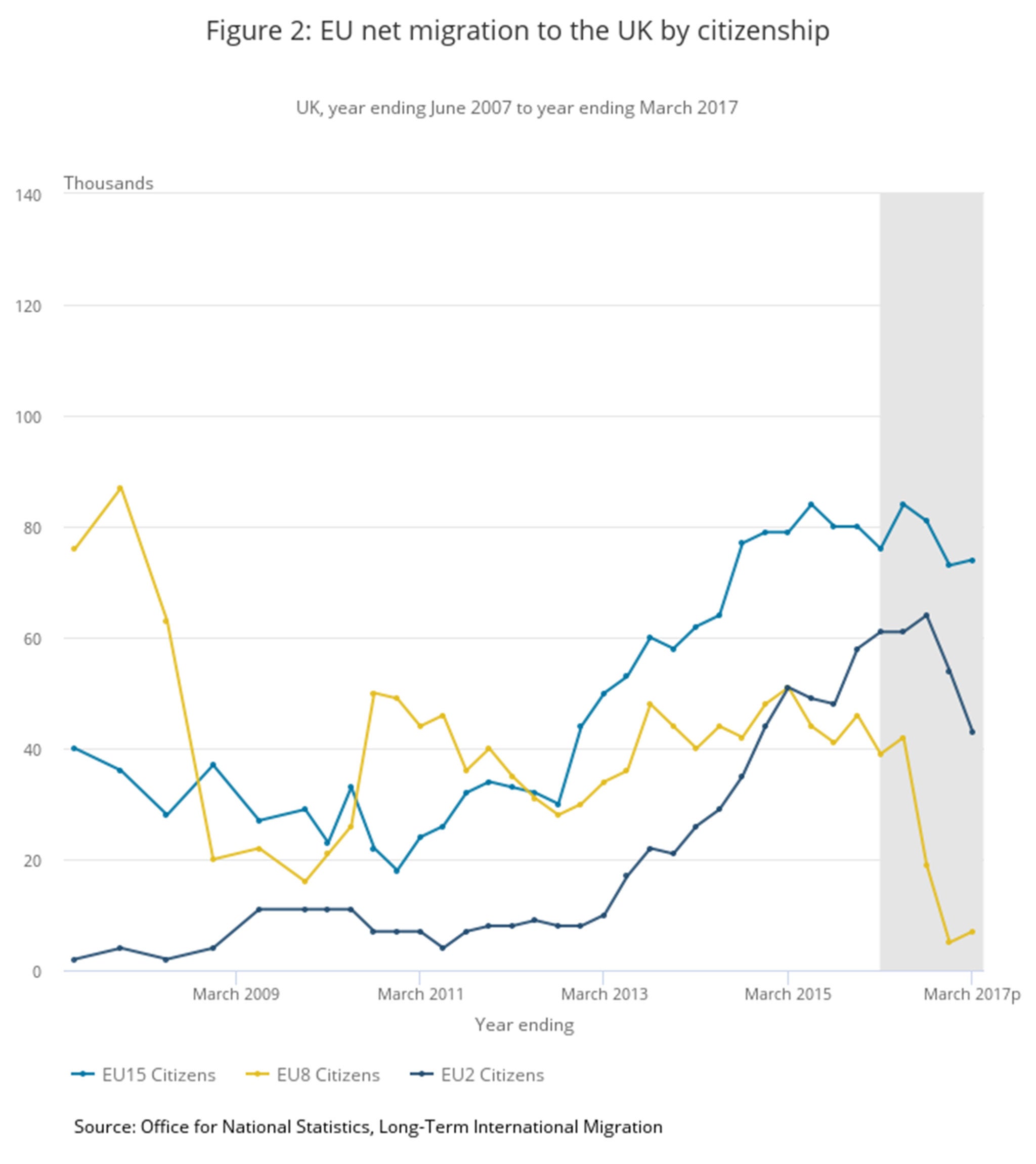'I don't feel welcome anymore': EU citizens explain why they are leaving the UK in their thousands
Statistics show 122,000 Europeans left UK in a year in what campaigners are calling a 'Brexodus'

Your support helps us to tell the story
From reproductive rights to climate change to Big Tech, The Independent is on the ground when the story is developing. Whether it's investigating the financials of Elon Musk's pro-Trump PAC or producing our latest documentary, 'The A Word', which shines a light on the American women fighting for reproductive rights, we know how important it is to parse out the facts from the messaging.
At such a critical moment in US history, we need reporters on the ground. Your donation allows us to keep sending journalists to speak to both sides of the story.
The Independent is trusted by Americans across the entire political spectrum. And unlike many other quality news outlets, we choose not to lock Americans out of our reporting and analysis with paywalls. We believe quality journalism should be available to everyone, paid for by those who can afford it.
Your support makes all the difference.“I don’t feel welcome here anymore,” says Lukasz, a Polish man who has lived in the UK since he was eight years old.
“It’s like staying at someone’s house and you definitely outstayed your welcome – that’s how I feel.”
The 28-year-old is one of thousands of European citizens considering leaving Britain because of last year’s vote for Brexit.
Figures released by the Office for National Statistics (ONS) showed that 122,000 Europeans left the UK in the year to March, with the unprecedented exodus driving a drop in net migration.
Business groups have raised mounting concerns over “brain drain” from vital industries, while organisations representing EU migrants have urged the Government to offer solid guarantees over their status following Brexit.
Lukasz, who did not want his second name published, moved to London as a young child when his mother was offered a better job in the capital.
Educated in Acton and Greenwich, he now drives London buses and said he sees the UK as “home” and feels like more of a “tourist” in Poland.
“I enjoy the diversity of people and culture here – nothing and no one is the same, I have made many friends from all over the world,” Lukasz told The Independent. “I love the UK.”
In the period following the EU referendum, which saw a spike in hate crime including a student being stabbed in the neck “for speaking Polish”, he started feeling unwelcome.

“Someone sprayed ‘GO HOME’ on a Polish shop near me,” Lukasz said.
“Racism has shot up, I started noticing at work … I had few passengers arguing between each other.
“My mum had an incident where she was on a bus with my two-year-old sister, where a guy said ‘f**k off, go back to your country you b****, if not I will stab you’.
“Maybe this guy was not mentally stable, and it was reported to the police, but in 20 years of living in the UK I never heard anyone be racist to me or my family. Since the referendum it has all come out. “
Lukasz now feels his 20 years of effort to fit into Britain’s way of life is “wasted” and is saving up to leave the country shortly before the deadline for Brexit.
He said he will miss his life-long friends, the food and the diversity of London, but fears that the UK is “isolating itself”, adding: “It’s like the world is going backwards now and everyone wants to shut its doors.”
Matteo Mencarelli, a 30-year-old Italian man, has moved from the UK to Bulgaria in the wake of Brexit.
He arrived in London for a master’s degree at the School of Oriental and African Studies (SOAS) in 2010 and has since been working at the UK office of the European Council on Foreign Relations.

Mr Mencarelli described his years in the British capital as “priceless” and a “completely different world” from his previous homes in Rome and Toronto.
Like many Europeans living in largely Remain-voting London, he was shocked by the referendum result.
“Perhaps my friends, colleagues and I were too naive and didn’t think it would actually happen but once it did, it had a huge impact on us,” he said. “For the first time we felt unwelcome here.”
Mr Mencarelli said the vote to leave the EU acted as a “catalyst” for him to pursue a career working for international organisations in the Middle East and is planning his future while living with his partner in Sofia.
“I miss living in London and I am extremely concerned for its future,” he added.
“I am hopeful that once the dust settles and a reasonable deal is struck with the EU, freedom of movement will be preserved and us Europeans will still be able to freely work and live in the United Kingdom. I do hope to be able to move back in a few years.”
Eva Scheffer, a Dutch aid worker, has already left the UK because of the potential impact of Brexit and now fears for her friends.
“I was offered a job in my field in the Middle East, and the uncertainty of whether or not I would be able to build a life in the UK after Brexit was definitely part of the decision to accept,” the 29-year-old said.
“I am very worried for my friends who are still there, both EU citizens and UK citizens.
“The EU citizens are in a very insecure position at the moment, as most of them haven’t been there for five years, so might be told to leave after Brexit – the same situation I faced when I was there.
“For UK citizens, especially many very international oriented ones, Brexit will cost them opportunities to work and study abroad.”
ONS figures show the vote to leave the EU is having a dramatic effect on migration even before any new laws are introduced.
Net migration has fallen by a quarter to 246,000, while EU net migration was down 51,000.
The ONS said the change was mostly caused by plummeting arrivals from the EU, as the number of European citizens leaving Britain rose by 33,000.
“These results indicate that the EU referendum result may be influencing people’s decision to migrate into and out of the UK, particularly EU and EU8 citizens,” said Nicola White, the head of international migration statistics.
“It is too early to tell if this is an indication of a long-term trend.”
Seamus Nevin, the head of employment and skills policy at the Institute of Directors, said the exodus could cause an “acute labour shortage” in vital industries.
But the Government is continuing plans to cut net migration to a target of 100,000 a year and said it was “encouraged” by Thursday’s figures.
“There is still more work to do to bring net migration down further to sustainable levels,” said immigration minister Brandon Lewis.
“People who come to our country to work bring significant benefits to the UK, but there is no consent for uncontrolled immigration.”
Ian Murray, the Labour MP for Edinburgh South, said the UK was facing a “Brexodus” that would damage the economy, universities and public services.
“When EU nationals with every right to be here are being sent letters telling them they will be deported, it is small wonder that increasing numbers of them are choosing to move away from Britain,” he added, referring to a Home Office blunder that saw 100 Europeans sent deportation notices “in error”.
Campaign group the3million, which represents EU citizens in the UK, said it was “little wonder” that so many were fleeing Britain.
“All we want is the assurance that we can continue our lives here as normal after Brexit,” added co-chair Nicolas Hatton.
“The UK Government must strike a deal with the EU which guarantees EU citizens’ current rights in full, permanently under the ECJ, and independently of the main Brexit agreement.
“Only then can we have the certainty we need that our future is in the UK, a country we love and which we want to continue to call home.”
Are you considering leaving the UK because of Brexit? Contact us by emailing lizzie.dearden@independent.co.uk
Join our commenting forum
Join thought-provoking conversations, follow other Independent readers and see their replies
Comments